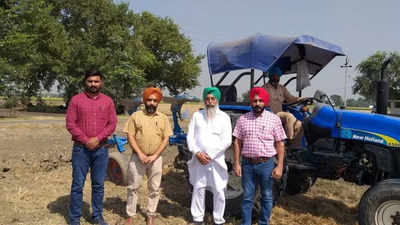- News
- City News
- ludhiana News
- Punjab: Jagraon farmer decomposes stubble on field for 5 years, reduces fertilizer consumption
Trending
This story is from September 22, 2021
Punjab: Jagraon farmer decomposes stubble on field for 5 years, reduces fertilizer consumption
The crop residue management has not only been playing a crucial role in curbing the stubble burning menace in Punjab but also has been ensuring enormous benefits to the farmers who have been harvesting the stubble in the fields for the past few years.

Agwar Pona village farmer Lakhwinder Singh
LUDHIANA: The crop residue management has not only been playing a crucial role in curbing the stubble burning menace in Punjab but also has been ensuring enormous benefits to the farmers who have been harvesting the stubble in the fields for the past few years.
The farmers, who decompose the stubble in the fields, are saving their money on the fertilizers and witnessing improved soil health and increased fertility.
Jagraon's Agwar Pona village farmer Lakhwinder Singh says that he has been managing stubble through in-situ technique for the last five years. "I have been using 20-per cent less DAP and Urea in the field. The soil structure has also improved considerably," told Singh.
He added that he has been using paddy stubble chopper to harvest residue in the soil due to which yield of potato crop has increased considerably. Besides, dependence on fertilizers has also been reduced.
Agriculture Development Officer (ADO) Dr Raminder Singh said that if all farmers adopt these techniques, they can save crores of rupees they spend on purchasing nutrients like nitrogen, phosphorus and potash.
He said that the management of paddy stubble will add up substantial amount of nitrogen, phosphorus and potash. Singh said residues help to protect the soil from wind and water erosion and keep the soil cool by preserving water instead.
Exhorting the farmers to adopt in-situ crop residue management wholeheartedly to manage the stubble, he said that burning of paddy stubble is very hazardous for the farmers and land, which is considered as 'mother' by our agriculturalists. He said that the burning of paddy ruins the health of soil besides casting a castigating effect on the environment.
He added that due to the burning of paddy stubble, several major and micronutrients of soil get destroyed and that it also produces several poisonous gases which have an adverse effect on human health.
The farmers, who decompose the stubble in the fields, are saving their money on the fertilizers and witnessing improved soil health and increased fertility.
Jagraon's Agwar Pona village farmer Lakhwinder Singh says that he has been managing stubble through in-situ technique for the last five years. "I have been using 20-per cent less DAP and Urea in the field. The soil structure has also improved considerably," told Singh.
He added that he has been using paddy stubble chopper to harvest residue in the soil due to which yield of potato crop has increased considerably. Besides, dependence on fertilizers has also been reduced.
While sharing his experiences regarding the benefits of stubble management, he felt that the hardness in soil and improved soil health, besides the yield of wheat, moong and potato increased significantly.
Agriculture Development Officer (ADO) Dr Raminder Singh said that if all farmers adopt these techniques, they can save crores of rupees they spend on purchasing nutrients like nitrogen, phosphorus and potash.
He said that the management of paddy stubble will add up substantial amount of nitrogen, phosphorus and potash. Singh said residues help to protect the soil from wind and water erosion and keep the soil cool by preserving water instead.
Exhorting the farmers to adopt in-situ crop residue management wholeheartedly to manage the stubble, he said that burning of paddy stubble is very hazardous for the farmers and land, which is considered as 'mother' by our agriculturalists. He said that the burning of paddy ruins the health of soil besides casting a castigating effect on the environment.
He added that due to the burning of paddy stubble, several major and micronutrients of soil get destroyed and that it also produces several poisonous gases which have an adverse effect on human health.
End of Article
FOLLOW US ON SOCIAL MEDIA











